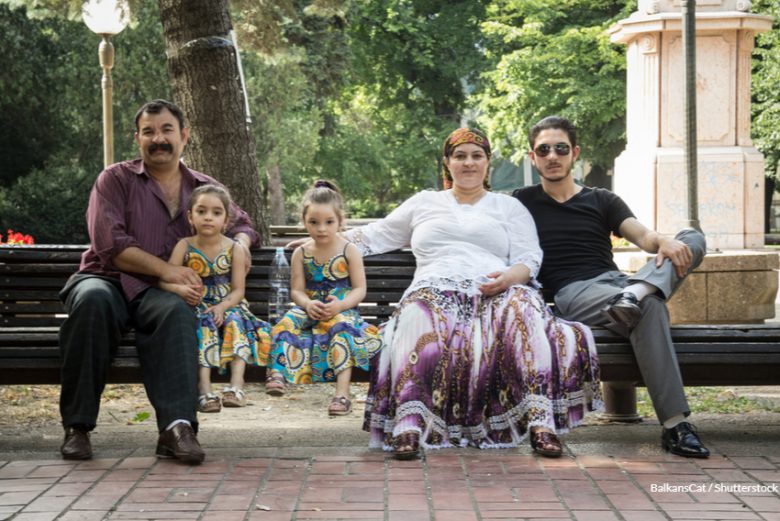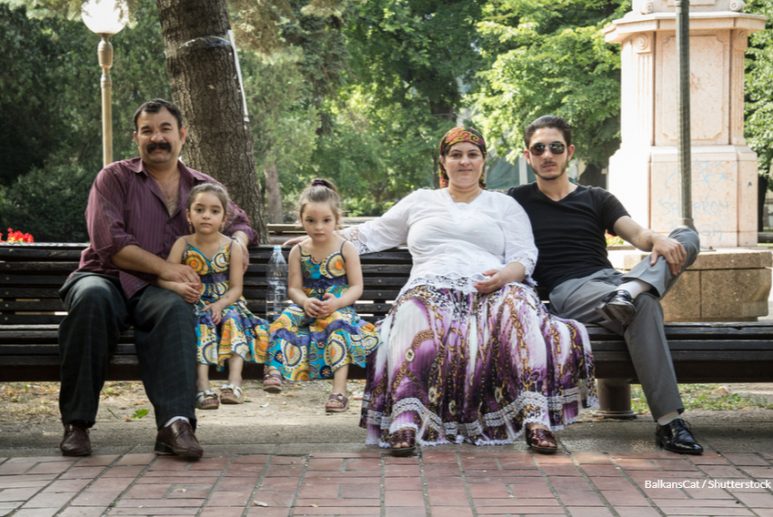By Angelo Boccato
Before the beginning of the Second World War the Roma population of Europe was estimated to be approximately one million. However, researchers estimate that by the end of the war only 20-30% survived the Holocaust which is known as Porajmos in the Romani language.
The account of a Roma survivor which is cited in the Council of Europe’s Handbook for Education with Young People on the Roma Genocide is striking:

“In November, 1942, the pogrom against the Jews and Gypsies began, and they were shot on a mass scale in street executions … . It was cold, and the Gypsy women were weeping loudly. They had all their possessions on their backs, including eiderdowns; everything that they had, but all of that was taken away from them later… . They were taken to the station and loaded into goods wagons, which were sealed and taken to stations beyond Chelm, to Sobibor, where they were burnt in the ovens.”
However, to this day, the Roma Genocide is scarcely debated, discussed or even remembered.
It is worth noting that survivors of this genocide struggled to gain recognition and that those responsible were not prosecuted. In addition to that, the commemoration of Roma and Sinti victims has been ignored in monuments commemorating the victims of Nazism.
This lack of representation has led to widespread hateful and negative attitudes towards the Roma population. For example, in early February British comedian Jimmy Carr included a joke to his Netflix show His Dark Material on the positives of the Holocaust that was directed toward the Roma. Such comments highlight how much hateful narratives on Roma, Sinti, Gypsies, and Travellers are part of the mainstream and do not encounter unanimous condemnation.
The joke in question has been at the centre of a letter to Netflix signed by the Roma Support Group, the Traveller’s Movement and Hope not Hate called the decision to leave the comment on the show “reprehensible” and added:
“We also strongly believe in free speech and people, including comedians, being able to say things that we might personally disagree with. But with freedoms comes responsibilities, and in any modern democratic society, there are lines that should not be crossed. A line was crossed here.”
This is in fact also intertwined with the way in which Gypsy, Roma and Travellers are portrayed in the media today, also in the UK, and the fact that these portrayals are frequently offensive, as seen in programs like My Big Fat Gipsy Wedding.
In general, there is a problem of under-representation for these communities, and last year the trade union Equity ,which represents nearly 50,000 performers all over the UK, pointed out that Gypsy, Roma and Travellers are under-represented on screen.
Actor John Connors, who played Patrick Ward in Love/Hate, opened up on how he was discriminated against because of his Irish Traveller background. He said that while his fellow actors of the Irish show Love/Hate were asked questions about their dream roles in Hollywood, he was asked questions about Traveller crime instead.
The European Union Agency for Fundamental Rights (FRA) published a report in 2020, which analysed the living conditions and the level of discrimination that Roma and Travellers face in Western Europe.
Some of the main findings of the Roma and Traveller Survey are absolutely telling as
“[o]ver 90% of Travellers in Belgium, Ireland and the Netherlands say that there are not enough places for them to live. Every fourth Roma and Traveller child surveyed lives in a household that cannot afford basic items, such as healthy food or heating, or has trouble paying the rent. Many face hunger. And their life expectancy is 10 years lower than among the general population”.
When it comes to employment
“Fewer Roma and Travellers are in paid work compared to the general population. This ranges from 15% in Ireland to 50% in Belgium. For women and the young, the employment situation is particularly hard” and when it comes to schooling: Almost a third of parents said that their children have been verbally harassed at school because they are Roma or Travellers. Two thirds of young Roma and Travellers completed only lower secondary education.”
Does satire have limits?
When we look at the case of Jimmy Carr and the responsibilities of streaming networks we need to look at three elements. First of all, there is a minority group which is facing discrimination under different points of view, to this day, then there is a comedian who believes that joking about the “positives” of a genocide can be considered a piece of entertainment and at the same time, there is a streaming giant which has previously worked with HOPEnot Hate for the documentary Nail Bomber: Manhunt but has so far ignored the organisation’s call regarding this hateful “joke”.
The debate on the limits of satire is long and complicated. However, satire has been used for centuries to mock those in power. When it mocks minority groups as well as vulnerable populations satire becomes hate speech. Although the comedy world is full of people who mock others in order to become viral, there are some bright examples that are the exception. One of those is Dario Fo, a Nobel laureate who, along with his late wife, actress Franca Rame, dedicated their lives and careers into mocking the powerful and not the marginalised. A tradition that dates back to Ancient Greece.
Comedians like Trevor Noah, Hasan Minhaj and Aamer Rahman along with others are also good examples of how it is perfectly possible to work on engaging stand up comedy, which challenges preconceptions, stereotypes,without degrading minorities.
When certain types of comedy are criticised for being offensive, several media pundits and commentators bring up freedom of expression. However, when comedy targets minorities it can lead to hate and discrimination. When minorities, vulnerable groups and underrepresented communities are the centre of an offensive ‘joke’, the consequences that this joke may have need to be highlighted and denounced.
Recent cases have highlighted that despite progress in recent years, more steps have to be taken in order to ensure a fair representation of Gypsy Roma and Traveller communities. Similarly, genocide should not be the subject of jokes.
Photo Credit: BalkansCat / Shutterstock

